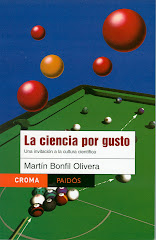by Martín Bonfil Olivera
Published on Milenio Diario, May 6, 2009
 The influenza outbrake that has kept Mexico City - and the whole country - semi-paralyzed since April 24 leaves several points clear.
The influenza outbrake that has kept Mexico City - and the whole country - semi-paralyzed since April 24 leaves several points clear. First, the outbreak was expected. Not necessarily in Mexico, or from viral sub-type H1N1 (the favorite candidate was H5N1 which caused the avian flu outbrake in 2006). But evolution, the nature of these viruses —promiscuity; fragmented genome; human, swine and avian hosts— and the natural history of influenza made it perfectly predictable that sooner or later we would be facing another pandemic.
Second, a problem of this magnitude its not only a scientific or medical matter: it affects the whole of society: economy, politics, diplomacy, daily living (we chilangos, inhabitants of Mexico city, know that well). International organisms (especially the World Health Organization) had the good sense to foresee and prepare measures to contain the inevitable: manuals, international agreements, labs, purchase of anti-viral drugs…
Mexico simply followed these indications —not ideally, but adequately, considering our limitations— when the outbreak data were clear.
Now there's talk of slowness in the response, but one of the bad things about an epidemic outbrake is that it cannot be recognized until it's there. To declare the alert before being sure was too high a risk (there are also those who say that the measures were excessive, but the virus could have been very lethal: H5N1 kills 50% of people infected.)
My usual readers know that I don't support Felipe Calderón, our non-legitimate president. But in this case, the actions of his government, as well as the ones from Marcelo Ebrard's (in Mexico City) were not only appropriate, but successful. The intellectual credit for this is for the international medical community; but the political credit is theirs.
The lessons from this situation are that we have to demand more support for scientific investigation and the reconstruction of a health system that works on prevention and research —not only in health attention. There's also a necessity of a much better communication strategy for authorities. And finally, an urgency to have more well prepared science journalists, to avoid the epidemy of conspiracy theories that only make social reaction much more difficult.
(translated by Adrián Robles Benavides)
To receive Science for pleasure weekly
in your email, subscribe here!
 The influenza outbrake that has kept
The influenza outbrake that has kept 



No comments:
Post a Comment